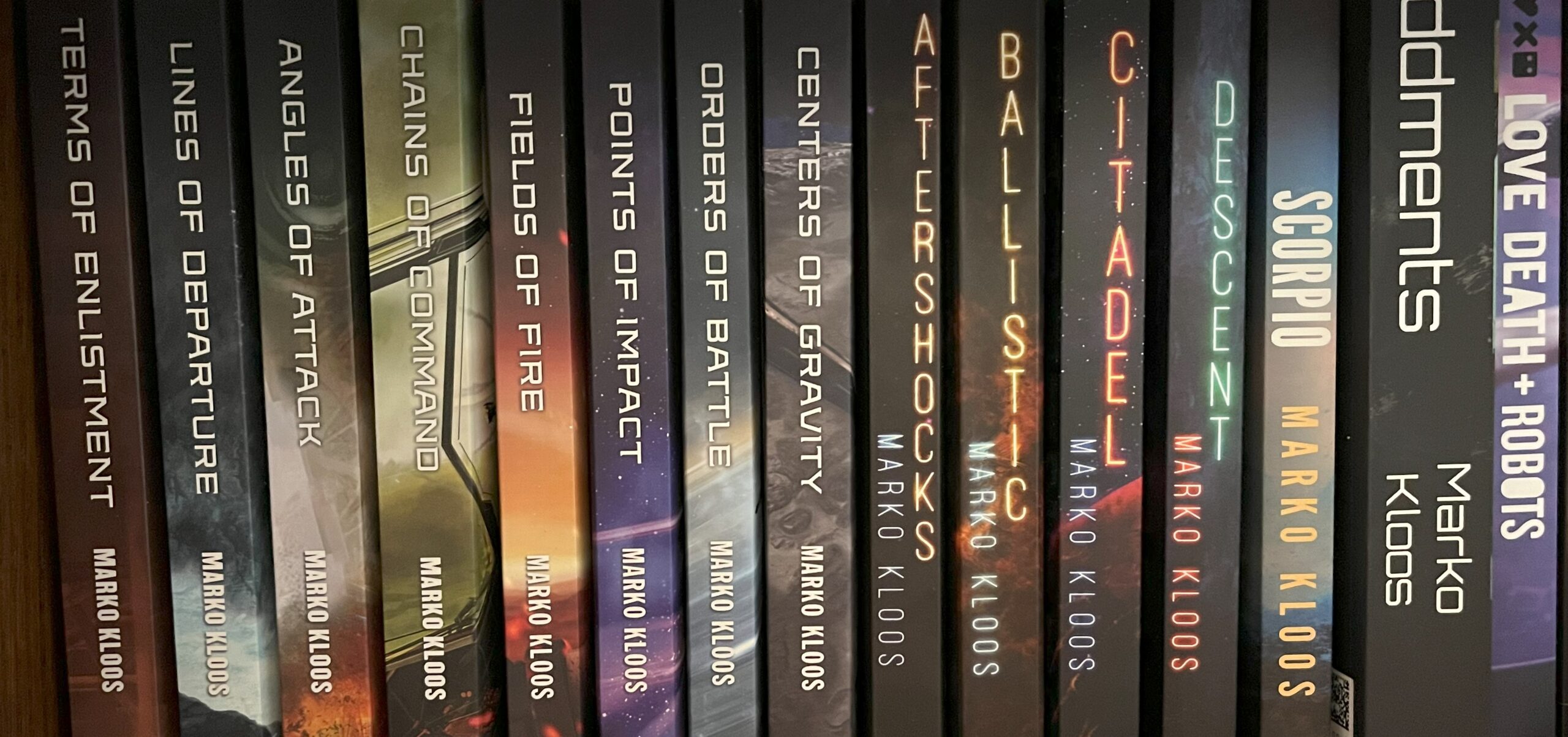Part of what I have tried to accomplish with Frontlines is breaking out of the typical military SF mold a little bit when it comes to depicting soldier mindsets. With the sixth book in particular, I wanted to address the endless wars we tend to fight lately, and their effects on the minds of the men and women we ask to fight those wars. I’m not just talking about PTSD, which is very much on the radar of the non-military public lately because of its prevalence among combat veterans. What I also wanted to show is the difference between the military and civilian worlds, and the alienation and anxiety this difference can cause in combat soldiers, who have to do a radical adaptation from one mindset and environment to a completely different one, mostly without assistance or mental preparation.
This article at the Social Health blog, “Military betrayal, civilian isolation” addresses the problem in fascinating detail. It’s a year and a half old, but still very much relevant, and it’s incisive and thought-provoking. Long story short: PTSD is a problem, but the mental stress experienced by veterans is much more multi-layered.

Interesting article, though I think it is a bit biased. The points about corruption are certainly valid, though the specific example used is something the US military is zealously crushing. My issue is that the author seems to see many of the military traits or characteristics as negatives and civilian society or culture as positive. I believe that, in some cases, the military traits are far superior, and in others they are merely different not inferior or wrong. Veteran’s struggles are exacerbated by finding themselves in a culture where people do NOT value responsibility, loyalty or personal sacrifice and do not have realistic understandings of “how the world really works.” Crying for our veterans to adapt more effectively, should be called in the same breath as scything criticism of our bubble-minded society. I would also say that the dichotomy of the military ideal in contrast to the reality of bureaucracy is one that many can adapt to. Perhaps compare it to the ideal versus the reality of marriage? The real telling point of the article though is the idea of institutional betrayal – of how deeply our leader’s corruption and moral transgressions can wound our Soldiers. That one bears further development and ever greater emphasis. I think that at the end of the day, those who naturally cleave to the military values, gravitate to the military and away from society – small wonder they don’t want to return. It would be nice if society would stop labeling every emotional outburst by an angered vet as PTSD and instead perhaps look to their own broad shortcomings – maybe angry vets have every right to be angry?
Excellent article at the Social Health blog! I wound up being diagnosed and treated at the VA within a year of retiring from the Air Force. There were days I didn’t want to get out of bed, let alone deal with people. They’ve helped a lot, but I do feel bad for other vets who may have experienced this during their transitions to civilian life.
Society perceives the return differently now a days. Plenty of Veteran struggled with mental health issues when returning from previous wars. Mental Health issues were not something that was talked about back then. But there were plenty of Veterans back in the day that suffered from PTSD, it just went untreated. Additionally medical care and body armor has advanced to the point where service members are surviving things that would have killed them in the past. We are also fighting insurgents and that has some lasting effects because while in country you don’t know who the enemy is.
I love your books from number 1 to 6. I am a US Marine Veteran and I did two deployments to Iraq. I have always appreciated your realistic point of view. You represent the mindset of a Veteran or service member well.
What is it about the modern military that makes going back to civilian life so much more difficult than it was for previous generations?
I think it’s a combination of things. The switch to an all-volunteer military is part of it–long-term professional soldiers instead of draftees tend to separate militaries from their societies more than compulsory service armies. Another factor is the disconnect that comes from the fact that the world has become more peaceful and the population at large has no experience with violence. They can’t relate to those who do, especially when the ability to use tools of violence is considered unsavory at best among most civilians.
What made it hard for me was that people just couldn’t relate in the civvy world. Another hard part was the routine that I were used to, a sense of orderliness and purpose. Even just getting up in the morning was less brain power, all I needed to do was wear green rain or shine. But the most difficult part is the friendship you leave behind.
U S Army vet. I found one of the biggest problems is no motivation in overall direction in civilian life. In past times of conflict and war there was the draft. Since the advent of the all volunteer military you attract the ones who have an inclination/shared idea. That means you are attracting a specific subset of the population, hence that specific set shares to a large degree specific values and views about many things.